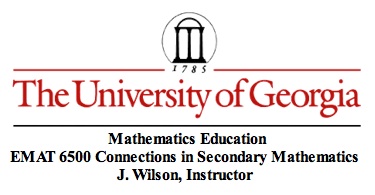

COURSE SYLLABUS
EMAT 4000/6000 Special Problems in Mathematics Education
Summer Semester 2014
Last modified on May 12, 2014
(Statement required by the University!!)
A course syllabus is a general plan for the course; deviations announced to the class by the instructor may be necessary.
Course: EMAT 4000/6000 Special Problems in Mathematics Education
Instructor:James W. Wilson
110F Aderhold Hall
Telephone (706) 542-4552
FAX (706) 542-4551
e-mail: jwilson@uga.eduTeaching Assistant
Leighton McIntyre
e-mail: mr1mcint@uga.edu
Office hours: I maintain an open door policy for office hours. I come to the office early each morning (usually by 8:008:00) and if I am not tied up in a meeting or talking to another student I am available to you. For the Maymester term the afternoon schedule is uncertain. I can always be reached by e-mail or at 706-248-3388, either text or voice.
Prerequisites for EMAT 4000/6000: MATH 2210 or 2260. If you have not studied differential and inferential calculus, discuss the situation with me.
Objectives
To engage in some independent investigations of mathematics topics.
To communicate about those mathematics investigations in writing and in presentations.
To become aware of and implement the CCSS standards for mathematical practice
Course Description.
A "Course Section" and meeting time (9:00 - 11:30 Daily) have been created. The NEED here is that students must have a course satisfying the Teaching Field (mathematics content) requirements of our degree programs.
Normally EMAT 4000/6000 is available every semester as an Directed Study and can serve a variety of needs. Directed Study involves making a plan with a faculty member who can agree to supervise such work. If you have made such alternative arrangements with another faculty member please register with this number and notify the instructor (J. Wilson).
The specifics of the syllabus of this class which will meet from May 13 to to June 2 (with Final Examination and/or Course Projects due on June 3) will focus on the study of some mathematics topics. Allowing for individual interests will be accomplished with the use of course projects. Recognize that the mathematics background in the class ranges from middle school teachers to secondary school teachers to collegiate teachers. Frequent individual presentations will be expected so that we all benefit from the variety of Course Projects.
Note that the emphasis in this session is the mathematics content rather than mathematics curriculum materials or mathematics instruction.
Course Assignments
There is no textbook.
Some materials will be distributed in class; much will grow from class discussions
The plan is to work in small teams to develop documents and presentations on the following topics:
The Geometry of Inversion via GSP implementation. The document should include basic introduction to Inversion, a library of images showing exploration with GSP, and some applications
Taxicab Geometry with Graph implementation. The document should include a variety of images illustrating various ideas and also include applications.
Conics from various points of view -- algebraic, geometric, 3D conic sections -- and how they are all related.
Other topics may be possible. We will work in teams of 3 people. The instructor will provide an overview and directions/redirection of the work.
Grades and Requirements
Grading is a necessary part of what we do and it is my intention to base grades on performance in meeting the requirements of the course. This performance includes the following:
1. Attendance
2. Participation
3. Group Reports
4. Projects
UGA Academic Honesty Policy
The University of Georgia seeks to promote and ensure academic honesty and personal integrity among students and other members of the University Community. A policy on academic honesty has been developed to serve these goals. All members of the academic community are responsible for knowing the policy and procedures on academic honesty.
As a University of Georgia student, you have agreed to abide by the University’s academic honesty policy, “A Culture of Honesty,” and the Student Honor Code. All academic work must meet the standards described in “A Culture of Honesty” found at: www.uga.edu/honesty. Lack of knowledge of the academic honesty policy is not a reasonable explanation for a violation. Questions related to course assignments and the academic honesty policy should be directed to the instructor.
Disclaimer
The content and opinions expressed on this Web page do not necessarily reflect the views or nor are they endorsed by the University of Georgia or the University System of Georgia.